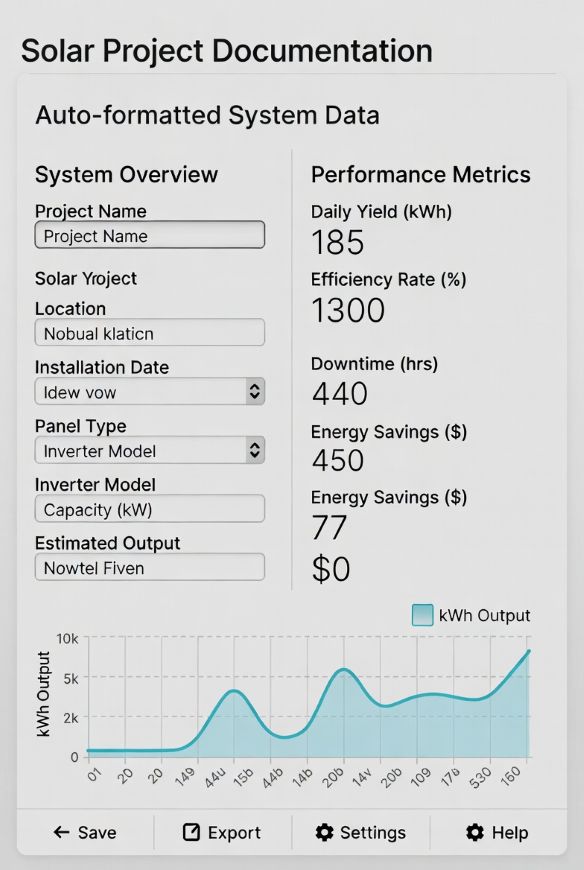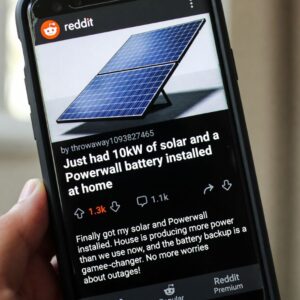Accelerating Solar Technology Projects with an SAP Implementation Partner
Global solar capacity has grown at double-digit rates for more than a decade, pushing project volumes, data, and timelines to levels many companies struggle to manage with spreadsheets and disconnected tools. As solar technology firms scale, operational complexity often rises faster than revenue, creating delays, cost overruns, and visibility gaps.
That pressure is why many solar companies turn to an experienced SAP implementation partner early in their growth journey. Partners such as Accely help solar businesses connect planning, procurement, installation, and maintenance into one ERP system. The result is smoother execution across projects that may span multiple sites, suppliers, and regulatory environments.

Why solar projects demand smarter systems
Solar technology projects are asset-heavy and schedule-driven. Panels, inverters, mounting systems, and grid components must arrive on time and in the right sequence, and teams must also understand how solar energy is used in homes and businesses to align installations with real-world needs. A single delay can ripple across an entire rollout. At the same time, teams must track permits, subcontractors, inspections, and long-term performance data.
Traditional tools often split this information across departments. Finance works in one system, operations in another, and field teams rely on manual updates. ERP platforms like SAP bring these threads together. They create a single source of truth that shows what is ordered, what is installed, and what still needs attention.
Improving project planning and resource management
Accurate planning is the backbone of profitable solar deployments.
SAP supports detailed project structures that map tasks, budgets, and timelines from site assessment through commissioning. Managers can assign labor, equipment, and materials with a clear view of capacity and constraints.
Resource management improves when teams see real-time data instead of last week’s reports. If a crew finishes early or a shipment is delayed, schedules can be adjusted quickly. This flexibility helps solar companies avoid idle labor and rushed installations, both of which drive up costs.
Real-time tracking from warehouse to rooftop
One of the strongest advantages of ERP in solar operations is real-time tracking. SAP systems monitor inventory levels, shipment status, and asset locations across warehouses and job sites. Field teams know exactly which components are available before they arrive on site.
This visibility extends beyond installation. Once systems are live, maintenance schedules, warranties, and performance data can be linked to each asset. Solar operators gain a clear picture of lifecycle costs and can plan service work before issues disrupt energy production.
Transparency and reporting for sustainable growth
Investors, regulators, and utility partners expect accurate reporting from solar technology companies. ERP platforms support standardized reporting across finance, operations, and compliance. Project margins, carbon impact data, and asset performance can be reviewed with confidence.
Working with a certified SAP implementation provider ensures these reports are built on clean data and aligned with business goals. Experienced partners understand both the technical setup and the operational realities of renewable energy projects.
The value of the right implementation partner
ERP software alone does not guarantee success. Implementation quality matters just as much as the platform itself. A knowledgeable SAP implementation partner helps solar companies configure modules to match real workflows, not generic templates.
Accely, for example, brings experience across energy and infrastructure projects. Its teams guide solar businesses through system design, data migration, and user training. This approach reduces disruption during rollout and helps teams adopt new tools with confidence.
Building a foundation for long-term performance
Solar technology companies operate in a market where efficiency and reliability define competitiveness. ERP systems create a foundation that supports growth without chaos. They make it easier to expand into new regions, manage larger portfolios, and respond to policy changes.
Choosing the right SAP implementation partner in the early stages can shape how smoothly a solar business scales. With integrated data, real-time tracking, and clear reporting, companies gain control over complex projects and stay focused on delivering clean energy.
Streamlining Technical Documentation Editing: Integrating Structured Data into Solar Technology Editors
Solar energy projects generate large volumes of technical documents every year, and many delays happen because of formatting issues rather than engineering errors. Permits, compliance files, and installation reports must follow strict layouts to meet regulatory and financing requirements. This places pressure on installers, engineers, and software teams that manage documentation. Editing tools that can automatically structure and format data are becoming essential in modern solar workflows.
Advanced editors in the solar sector are beginning to import structured datasets directly from external systems, much like platforms that generate hotel reservation for visa documents in travel technology. These systems can also provide metrics and insights on how solar panels work and their effici

Why solar documentation often breaks down
Most documentation issues in solar projects are surprisingly small. Tables shift between pages. System capacities appear in different units. Component serial numbers are placed inconsistently. These problems usually arise when teams copy data from spreadsheets into PDFs or combine reports from multiple tools.
Editing software designed for solar workflows can prevent these errors by separating data from layout. Instead of treating documents as static files, modern editors treat them as living structures. Each data point is mapped to a fixed position, ensuring clarity even when updates are required late in the project cycle.
Best practices for formatting automation in solar tools
Automation works best when editors follow regulatory and industry standards. Key fields such as system size, inverter model, site address, and installation date should be locked once approved. Page dimensions should align with common permit formats used by utilities and local authorities.
Template reuse is another critical practice. A single approved layout can serve multiple projects while maintaining visual consistency. When data changes, the editor updates the content without altering spacing or alignment.
- Standardize units for capacity and output.
- Use fixed tables for equipment lists.
- Export finalized files as flattened PDFs.
User interface design for solar documentation editors
Solar professionals value clarity over complexity. Editors should present only the controls needed for each step of the workflow. Clean dashboards reduce errors and speed up reviews. Live previews allow engineers to confirm accuracy before exporting files.
Freeform drag and drop tools often create inconsistencies. Structured input fields are safer and easier to validate. When external datasets are imported, confirmation prompts reassure users that values are correct and up to date.
Integration examples using structured external data
Solar platforms increasingly rely on external data sources for site assessments, component inventories, and compliance records. When editors connect to these sources through APIs, documentation becomes faster and more reliable. Data arrives in predictable formats, ready for automation.
A system layout report can populate multiple pages with consistent headers and tables. A compliance summary, similar in structure to a hotel reservation for visa document, can present site details, dates, and reference numbers in a clear, review friendly format. This reduces back and forth with regulators.
Turning raw solar data into regulator ready PDFs
The final step in any solar documentation workflow is export. Editors should remove editable layers and unnecessary metadata before saving. File names should follow clear conventions that include project name and location, making retrieval easy for inspectors and financiers.
When editing tools prioritize automation and readability, documentation becomes less of a burden. Installers spend more time on site. Engineers focus on system performance. Software teams deliver tools that remove friction instead of adding steps.
As solar projects grow in scale and complexity, demand will rise for editors that understand structured technical data. Integrating external systems, even those inspired by models like hotel reservation for visa platforms, points toward a future where solar documentation is accurate, consistent, and ready for approval.
Solar Startups and Reddit Marketing: Why Some Brands Turn to Aged Accounts to Build Credibility
 Solar startups raised over $28 billion in venture funding in 2024 alone. Yet many of these companies struggle to get noticed on Reddit, where new accounts often get ignored or flagged as spam. That hard reality pushes some founders toward a shortcut: buying aged Reddit accounts with established history.
Solar startups raised over $28 billion in venture funding in 2024 alone. Yet many of these companies struggle to get noticed on Reddit, where new accounts often get ignored or flagged as spam. That hard reality pushes some founders toward a shortcut: buying aged Reddit accounts with established history.
Reddit remains one of the few platforms where genuine conversation still drives trends. Subreddits like r/solar, r/solarenergy, and r/renewableenergy attract homeowners, installers, and investors who actually make buying decisions. A well-timed post about a new perovskite panel or a customer’s $0 electric bill can spark hundreds of thousands of visits. Smart marketers know this, so they look for reliable ways to join the conversation without starting from zero. Some turn to places like this Reddit account marketplace to find profiles that already have karma and age.
Why New Accounts Fail in Solar Communities
Reddit’s algorithm and its users punish obvious promotion. Post from a fresh account in r/solar with a link to your new microinverter? The auto-moderator removes it in seconds. Even if it survives, readers downvote and report anything that smells like advertising.
Aged accounts change the game. They can:
- Share “personal” stories about switching to solar without triggering spam filters
- Answer technical questions and quietly mention their own product
- Post customer photos or drone shots of new installations that look organic
- Cross-post success stories to larger subreddits like r/pics or r/dataisbeautiful
One California-based solar storage startup saw its waitlist grow by 8,000 people in a single weekend after an aged account shared a detailed review with real photos and a discount code. The post hit the front page of r/technology and stayed there for 14 hours.
The Tactics That Actually Work
Successful campaigns rarely look like ads. Instead, marketers use aged accounts to seed conversations months in advance. An account might spend weeks answering questions about panel efficiency or permitting headaches. Later, the same account shares a “case study” about a family that went off-grid with a new battery system, complete with charts and before-after photos.
Other common moves include:
- Hosting AMAs with engineers or early customers
- Releasing open-source tools for sizing home solar systems
- Sharing time-lapse videos of installations
These posts feel authentic because the account has history. Readers trust them more, engage more, and share more.
The Ethical Tightrope
Here’s where things get messy. Reddit’s rules clearly ban vote manipulation and paid astroturfing. Buying or selling accounts also violates the terms of service. When discovered, brands face permanent bans across dozens of subreddits and lasting damage to reputation.
Yet many founders argue the playing field isn’t level. Established players already own high-karma accounts from years of participation. New companies, especially those fighting climate change on tight timelines, feel forced to catch up quickly or miss the narrow window to scale. The same principle applies beyond Reddit: a strong, trustworthy online presence (including a reputable website) is crucial for long-term success in the solar industry. Building real authority and website reputation often matters even more than quick social media wins.
Some take a middle road. They hire community managers who build real karma the slow way, then hand over the accounts when the employee leaves. Others openly partner with popular Redditors and mark posts as sponsored, though those rarely perform as well.
Alternatives That Don’t Break Rules
Plenty of solar brands grow on Reddit without paid accounts. They contribute real value: detailed guides, transparent pricing data, or tools that help homeowners calculate payback periods. These companies often become subreddit staples, and their occasional product mentions get celebrated instead of buried.
The difference comes down to intent. Build trust first, sell second, and the community usually rewards you. Rush the sale with a purchased account, and the backlash can kill a young brand overnight.
Solar startups face immense pressure to scale fast and prove traction to investors. Reddit offers unmatched access to passionate early adopters. Some choose aged accounts as a shortcut to credibility, while others grind the long way. Both paths work, but only one keeps the community’s trust intact in the end.
Solar Technology and Website Reputation
 Solar technology’s reputation has changed how people and businesses think about energy. It offers clean, renewable power by converting sunlight into electricity through solar panels. This shift is not just about going green; it’s also about saving costs and supporting sustainability. Many households and companies are now turning to solar energy to reduce their dependence on fossil fuels. With the growing concern for the environment, solar power continues to gain attention as an accessible and practical solution.
Solar technology’s reputation has changed how people and businesses think about energy. It offers clean, renewable power by converting sunlight into electricity through solar panels. This shift is not just about going green; it’s also about saving costs and supporting sustainability. Many households and companies are now turning to solar energy to reduce their dependence on fossil fuels. With the growing concern for the environment, solar power continues to gain attention as an accessible and practical solution.
The demand for solar installations has led to rapid innovation. Modern panels are now more efficient, durable, and adaptable to different environments. Whether installed on rooftops, fields, or portable systems, solar technology has become a key part of energy planning worldwide. However, the growth of this industry also depends on how solar companies represent themselves online.
Why Website Reputation Matters for Solar Businesses
A company’s website is often the first place potential clients go to learn about its products and services. For solar businesses, the website represents not just what they sell, but also how trustworthy they are. A well-designed and transparent website can establish credibility, while a poor online presence can raise doubts.
Customers looking for solar solutions usually research multiple providers before deciding. If your website is informative, organized, and easy to navigate, it helps build confidence. On the other hand, outdated content, broken links, or unclear product details can make visitors leave.
Search engines also take reputation into account. Websites with positive reviews, quality backlinks, and consistent content updates tend to rank higher. This means that maintaining a strong website reputation not only builds trust but also improves visibility.
Key Factors That Influence Website Reputation
1. Content Accuracy and Transparency
People searching for solar products expect clear explanations of how systems work, what they cost, and what benefits they bring. Providing straightforward information without exaggeration builds credibility. Including FAQs, installation guides, and case studies also helps customers make informed choices.
2. User Experience and Design
A website should be easy to use. Visitors should find what they need within a few clicks. Fast-loading pages, mobile responsiveness, and clear navigation are essential. A slow or confusing website can make a business seem unprofessional.
3. Online Reviews and Testimonials
Customer feedback is powerful. Positive testimonials on your website and third-party platforms like Google Reviews can boost trust. Encouraging satisfied clients to share their experiences gives your brand authenticity. Responding politely to negative feedback also shows responsibility and care for customer satisfaction.
4. Search Engine Optimization (SEO)
A strong reputation goes hand in hand with good SEO. Using the right keywords, optimizing meta descriptions, and updating blogs regularly signal to search engines that your site is active and reliable. For solar companies, targeting keywords like “solar panel installation,” “renewable energy solutions,” or “solar power for homes” can bring in more organic traffic.
5. Security and Privacy
Website visitors need to feel safe. Installing SSL certificates (the “https” in your URL) protects user data and improves credibility. Secure sites also rank better in Google results, further strengthening your online reputation.
Building Trust Through Educational Content
For solar technology companies, education is a powerful tool for building reputation. Many customers are curious but not fully informed about how solar energy works or how much it costs. A website that explains these concepts in simple terms positions your business as a trusted expert.
Posting blogs, videos, and infographics about topics like “How Solar Panels Reduce Your Electric Bill” or “Understanding Net Metering” can help attract and retain visitors. Educational content not only showcases your knowledge but also increases engagement. Over time, this strategy builds brand authority and encourages referrals.
Additionally, using real-life examples and success stories makes the message relatable. When people read about families or businesses saving money through your solar solutions, they’re more likely to trust your brand.
The Connection Between Reputation and Growth
Reputation directly affects growth. A well-respected solar company will attract more leads and partnerships. Clients prefer working with brands they believe are ethical, transparent, and consistent. Positive reviews and strong online visibility create a cycle of credibility.
Conversely, a damaged reputation can slow progress. Negative reviews, misleading claims, or unaddressed complaints can spread quickly on social media and review sites. That’s why reputation management should be part of every solar business’s marketing strategy.
Monitoring mentions of your company, responding promptly to feedback, and keeping your website updated can help you stay ahead. Tools like Google Alerts, social media monitoring platforms, and analytics dashboards make it easier to track and manage your online image.
How Solar Energy Is Used In Homes Or Businesses
In Homes
Electricity Generation
Water Heating
Space Heating and Cooling
Solar-Powered Devices
In Businesses
Reducing Operating Costs
Backup Power and Energy Storage
Sustainable Branding
Selling Power to the Grid
The Solar Panel Structure
A solar panel typically includes:
Glass layer: Protects the panel.
Anti-reflective coating: Helps absorb more sunlight.
Silicon cells: Where the energy conversion happens.
Wiring & metal frame: Conducts electricity and holds everything together.
Explore How Solar Panels Work And Its Efficiency
Here’s a simple explanation of how solar panels work:
Solar panels are made of many solar cells (usually silicon-based). When sunlight (photons) hits these cells, the energy from the light is absorbed. When the sunlight energy is absorbed It knocks electrons loose from atoms in the semiconductor. The electricity produced is DC, but homes and businesses use alternating current (AC). The AC electricity can be used immediately to power devices.
Solar Power And Its Advantages
Advantages of Solar Power:
Renewable – The sun is not going to run out anytime soon.
Environmentally friendly – No greenhouse gas emissions during use.
Low operating costs – Once installed, solar systems require minimal maintenance.
Solar Energy Discussion
Solar power is the energy harnessed from the sun’s rays. It is a renewable, clean, and sustainable source of energy that can be converted into electricity or used for heating.
There are two main ways solar power is used:
Photovoltaic (PV) Systems
These use solar panels to convert sunlight directly into electricity. The panels contain semiconductors (usually silicon) that release electrons when exposed to sunlight, generating electric current.
Solar Thermal Systems
These use mirrors or lenses to concentrate sunlight and produce heat, which can then be used to generate electricity (e.g., in solar power plants) or provide hot water for buildings.







